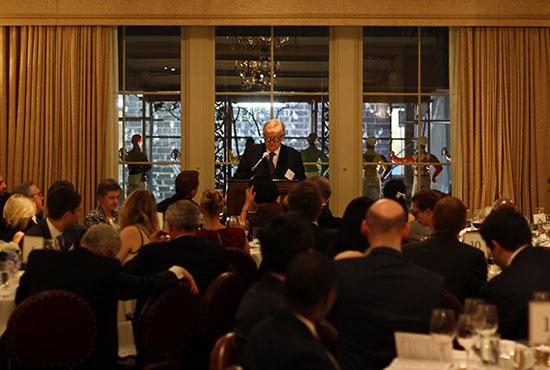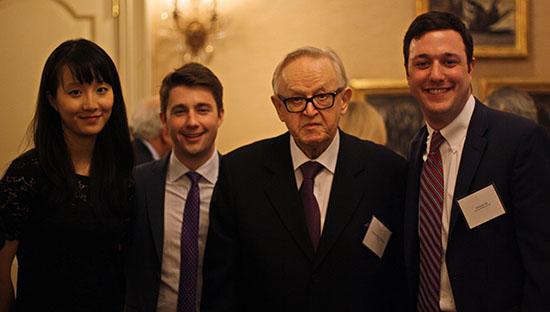Nobel Laureate Martti Ahtisaari Speaks to Law School Community About International Peace Mediation
The Friedmann Award and Conference Honored the Former President of Finland and United Nations Diplomat for His Career as a "Settler of Conflicts"
New York, April 22, 2016—At the age of 78, Martti Ahtisaari spent 226 days last year on the road, working and lecturing on diplomacy and conflict resolution. His travels brought him to Columbia Law School for two days at the end of March, when the former president of Finland, United Nations diplomat, and Nobel Peace Prize laureate received the 42nd annual Wolfgang Friedmann Memorial Award from the Columbia Journal of Transnational Law.
| Former President of Finland Martti Ahtisaari accepts the 42nd annual Wolfgang Friedmann Memorial Award from the Columbia Journal of Transnational Law at a March 30 banquet in Midtown Manhattan. |
At the next day’s Friedmann Conference, organized by the Columbia Society of International Law, he spoke to students and faculty about his work in international peace mediation and state building.
Modest and soft-spoken, Ahtisaari fielded questions and talked about bringing parties together in a respectful and meaningful way. The March 31 event was moderated by Suparna Reddy ’17, co-president of the Columbia Society of International Law, and introduced by Dean of Students Michelle Greenberg-Kobrin.
“Don’t think I am some wonderman,” Ahtisaari said. “I am extremely lucky. All of you can do what I’ve done, if you realize you can’t do it alone.
“You have to think about your colleagues, and particularly about the parties, because if they don’t want to be helped, there’s nothing to do.”
Over nearly 40 years, Ahtisaari played major roles in the Namibia independence process, U.N. negotiations over the status of Kosovo, and the deliberations that ended the three-decades-long conflict between the Government of Indonesia and the Free Aceh Movement. He won the Nobel Peace Prize in 2008 for his varied career of “great efforts, on several continents.”
Ahtisaari served as the president of Finland from 1994 to 2000. Today, he chairs the Crisis Management Initiative, a non-governmental organization he founded in 2000 to support peace processes around the world. Since 2009, he has also been a member of The Elders, a coalition of 12 public figures dedicated to promoting human rights and peace. Nelson Mandela began the group in 2007.
With the Elders, Ahtisaari has traveled the world, visiting leaders in Iran, South Sudan, and Myanmar. Last year he went to Moscow, where he reminded Russian President Vladimir Putin of a mission the Elders had made in 2012.
A missed opportunity
In February 2012, Ahtisaari was sent to speak about the Syrian civil war with envoys from the five permanent members of the UN Security Council. “I was mostly interested in meeting the Russian ambassador [Vitally Churkin], because we had both lived in New York when we were at the UN years ago,” he said. “You make friends—you may not always agree on the issues, but you can candidly discuss them.”
Churkin, he said, laid out a three-point plan to end the Syrian conflict, with the last point finding an “elegant way for Assad to step aside.” Russia has long stood by the Syrian President. Last year, it sent in troops, tanks, and aircraft. But in 2012, Ahtisaari asked Churkin whether his plan reflected a shift in the position of the authorities in Moscow. “He said yes,” recalled Ahtisaari, who then passed on the message to the American, British, and French missions. “But it didn’t lead to anything. It was a missed opportunity.” Real progress in Syria will not be possible, he said, until “the Americans and Russia can see eye to eye.”
Ahtisaari believes “all conflicts can be resolved,” but his optimism has been undermined by the current state of American-Russian relations. “I am sometimes surprised that during the Cold War you could sit with the enemy at the same table. Then the Cold War ends, you don’t talk,” he said.
“In Namibia, I recognized that if I didn’t have U.S. government backing I couldn’t do the job I was given by the UN General Secretary. We have to demand that the permanent members of the UN Security Council create the right conditions for the General Secretary to succeed. The permanent members have a special role, whether we like it or not.”
Honesty trumps neutrality
When a return to previous circumstances is not a viable or desirable option, negotiators must promote change, Ahtisaari said. “I am always annoyed when I hear people say the peace negotiator has to be neutral. It’s utter nonsense. The peace negotiator has to be an honest broker, and the people have to know, where are you taking us?”
Ahtisaari urged the students to help America “pick up its egalitarian goals again,” he said, remembering the U.S. as a different country when he first arrived here in 1977. “I came to a country that had egalitarian goals. Now when I come here, none of that is left. It can’t be so that if you are very rich you can buy an election,” he said, before diplomatically adding that he was not referring to a specific candidate for office today.
“This is how the U.S. became known and admired: If you came from a poor family, you still had a chance, a chance for a good education and health care. We have to stick to that. Sometimes you hear people say, ‘These are Western values.’ But these are global values. If the society gives us a chance, then we owe the society as well. I am almost 80, and I keep traveling, because I feel I have been given so much that I’ve got to help others who can benefit from my experience.”
| Ahtisaari stands with Columbia Journal of Transnational Law board members at the 42nd annual Wolfgang Friedmann Memorial Award Banquet on March 30. (From left to right: Sarah Chen '16, JTL Public Affairs Editor; Michael Brasher '16, JTL Public Affairs Editor; Ahtisaari; Alexander Ely '16, JTL Editor-in-Chief.) |
The Friedmann prize and conference
Ahtisaari was presented with the Friedmann award at a March 30 banquet at the ‘21’ Club. Columbia Journal of Transnational Law Editor-in-Chief Alexander Ely welcomed guests, followed by an introduction of Ahtisaari by Anu Bradford, a native of Finland as well as the Henry L. Moses Professor of Law and International Organization and co-director of the European Legal Studies Center at Columbia Law School. Past recipients of the award include such honorees as human rights advocate Aryeh Neier, former U.S. special envoy and Senate Majority Leader George Mitchell, and former Supreme Court Justice Sandra Day O’Connor.
The Friedmann award and conference are named after the late Wolfgang G. Friedmann, Professor of International Law and Director of International Legal Research at Columbia Law School. In 1960, Friedmann founded the Columbia Journal of Transnational Law. An expert in international law, he had fled his native Germany before World War II, and served with the political intelligence department of the British Foreign Office and the postwar Allied Military Government. He taught at Columbia Law School from 1955 until his death in 1972. He advocated for a world order based on mutual respect among nations, and was known for his courageous denunciations of the Nazi Party when he was a judge in Germany.
For 65 years, the Columbia Journal of Transnational Law has showcased the work of international law scholars. Today it has more than 400 subscribers, one-third of whom live outside the U.S. in more than 60 countries.

